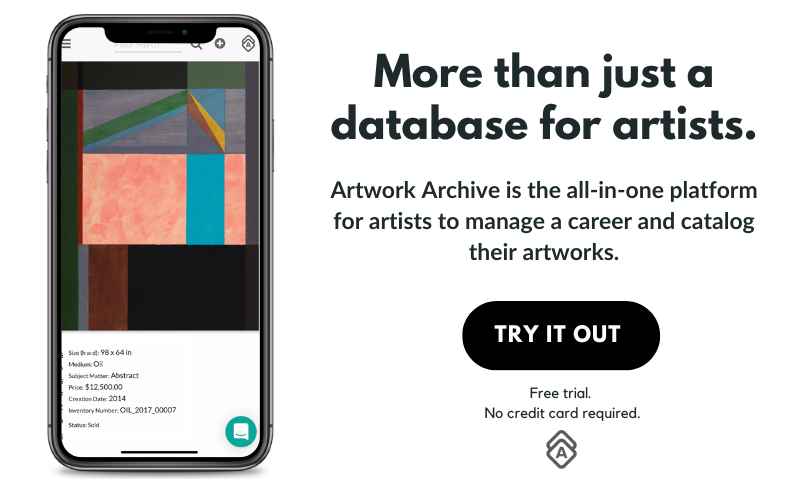Do you need a commission contract?
You’ve marketed your art by maintaining a strong online presence, like through your Public Profile on Artwork Archive. Or maybe you’ve built a relationship with a client and shown them your work with a curated Portfolio Page report.
Now it's time to manage the next step of your project by using a commission contact to nail out the terms and conditions for your work agreement.
What is a commission contract?
A commission contract outlines the conditions for an artist to create a commissioned work. Contracts generally specify project dates, payment schedules, notable project requirements, or constraints. They also build out scheduled check-in points for the artist and commissioner.
When should I use a commission contract?
Whenever you are being asked to create a specific work, usually on a larger scale or of a higher value, for an individual, business, or group–you’ll want to make sure you are using a commission contract.
Commission contracts keep all parties accountable and clearly define expectations for projects.
If you are commissioned to create a public art project, something for a business, or for an organization you will likely be provided with a commission contract to review and sign.
However, even if a project or commission is small, having formal timelines and conditions of the commission in writing keeps your projects on track. Commission contacts should be a key part of your professional toolkit.
Why is a commission contract important for an artist?
Commission contracts guarantee that you will be paid and that you will be paid on time. Likewise, commission contracts might ensure that your material costs will be covered.
Large projects change and shift. Having a commission contract in place ensures that you will be compensated for your time even if a project is put on hold or there are unexpected circumstances.
Commission contracts can help you give shape to projects by providing check-in points to make sure that the project is in line with the vision of the commissioner.
Why should a commissioning party use a commission contract?
Commission contracts allow the commissioner some control over and input into a project.
Just as a commission contract guarantees you payment, a commission contract guarantees the commissioner deliverables and tangible ways to see their commission come to life.
If a commissioner is unhappy with how an artwork is taking shape and there are check-ins built into the contract, they are able to give feedback before the project is completed.
These types of scheduled check-in help you ensure that the person or party paying you for your work will be satisfied with the final project.
Outline of a Commission Contract
A Commission Contract generally includes:
-
An Introduction that explains the project, defines the artist and commissioned, and details the specific work that is being commissioned.
-
Payment Terms and Agreement that specify the agreement for payment installations. For commissioned works, artists are generally paid 50% of the agreed-upon price upfront and 50% when the commission is complete.
-
Rights that define who owns the work after it is finished, an agreement about reproduction rights of the work, as well as stipulations about if the work is allowed to be exhibited, loaned, etc.
-
An Artwork Proposal that details what the final commissioned work will look like. Sometimes artists include a prototype, sketch, or example of similar work.
-
A Termination Agreement that lays out how the agreement could be ended between the artist and commissioner and payment terms/ material cost if this is the case.
Commission Contract Details
If you are reviewing or creating a commission contract, make sure to cover more than just the basic topics of a commission contract. More is not less. Structure and details will make your relationships stronger with your commissioning party. It will also help you to feel supported and prepared to create.
A timeline, including planned moments for check-ins about the art in progress, makes sure that you and your commissioner are on the same page. Depending on the scale of the commission, there might be multiple moments for checking in. While the commissioner might be familiar with your work, they have a vision in mind for how it will turn out. Make sure that all parties feel good about the commission process.
The more explicit and detailed you are about your needs in the commission contract drafting, the smoother the making process will go. Make sure to communicate your material needs if applicable, and be clear up-front about expectations around shipping, framing, and other non-artist costs. Hammering out details now prevents you from incurring unexpected future expenses.
Timelines, check-ins, and defined details throughout the commission process not only ensure a successfully completed project but pave the way for future commissions.
Click here to view a template example for creating a Commission Contract.
Keep your contracts on hand for reference
Make sure you have your contracts on hand for reference. Store contract templates and previous contracts in your My Docs section of Artwork Archive to protect your business.
Then, schedule your check-in with reminders on your schedule so that you don’t miss important dates with your commissioner.
Store your contracts, stay on top of check-ins and grow your art business with Artwork Archive.






